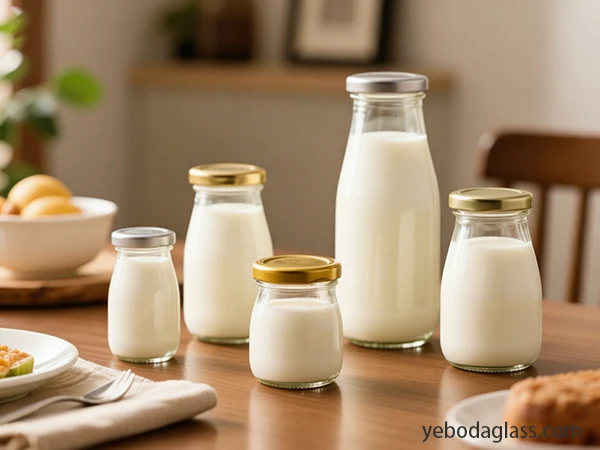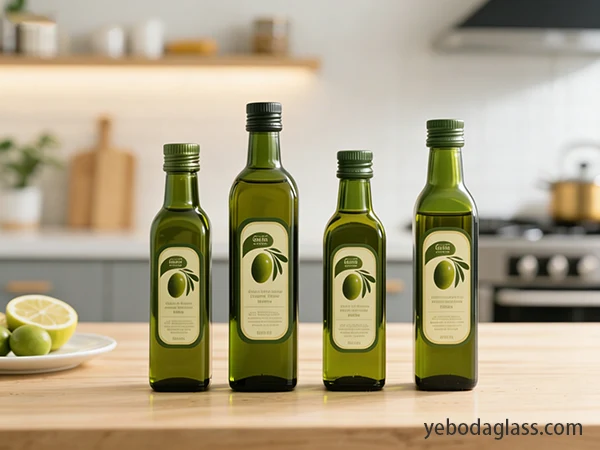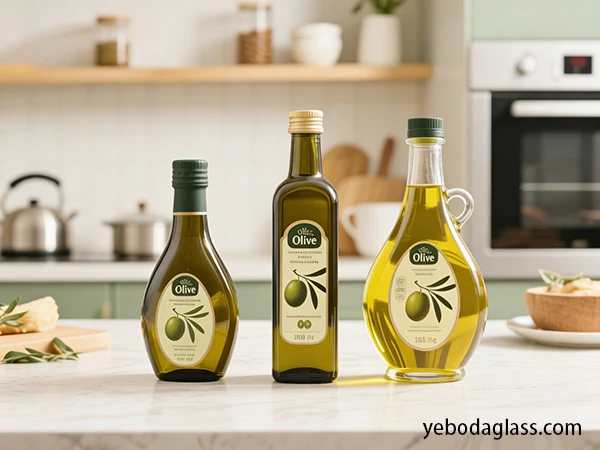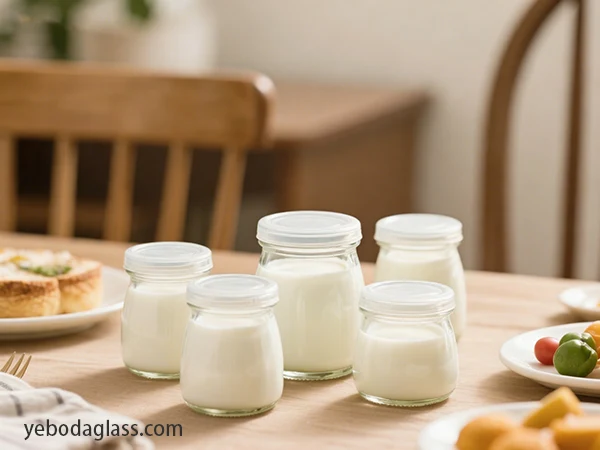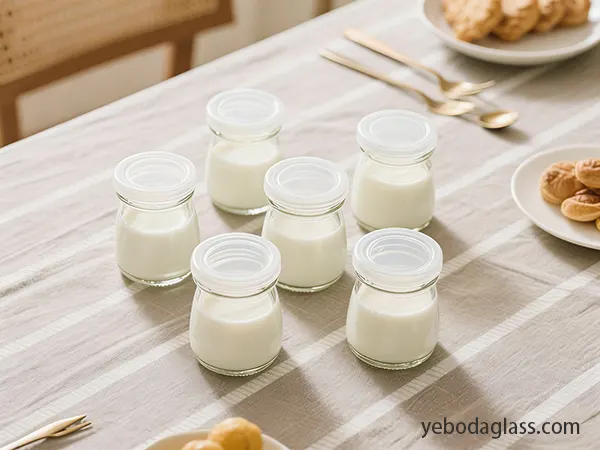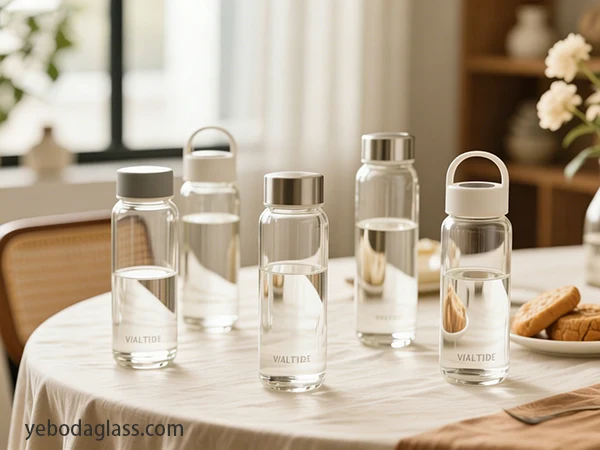Введение
Выбор наиболее подходящего поставщик бутылок с откидной крышкой Это ключевой стратегический шаг, влияющий не только на качество продукции, стоимость и устойчивость цепочки поставок, но и на конкурентоспособность рынка. Он позволяет покупателю увидеть всю картину целиком. Рассматриваются такие аспекты, как профилирование требований, поиск поставщиков по географическому признаку, идентификация, предварительная оценка и некоторые стратегические соображения. Мы хотим предоставить компаниям возможность принимать правильные решения, находить поставщиков, которые гарантируют им успех в долгосрочной перспективе и устойчивое будущее. Поставщик бутылок с откидной крышкой из Йебоды — яркий пример продуманного партнерства между заводом, обладающим глубокими знаниями и гарантией качества в производстве бутылок с откидной крышкой. стеклянные бутылки Это обеспечивает высокую стабильность и надежность. Их опыт в работе со стеклом и откидная конструкция гарантируют прочность и эстетичность изделия, что является двумя основными требованиями как для B2B, так и для розничной торговли.
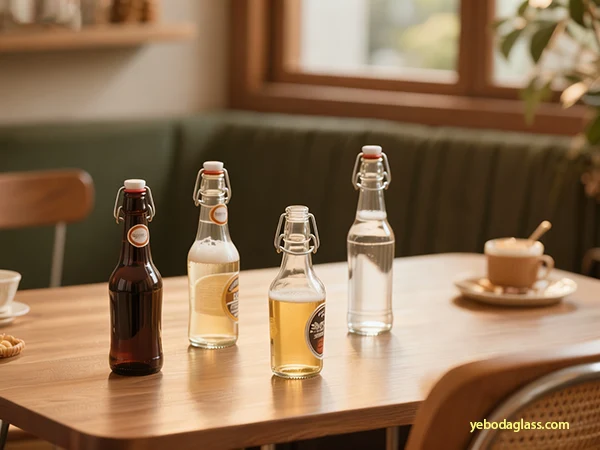
Комплексное профилирование требований
Определение требований на самом высоком уровне — это главный шаг перед поиском решения. бутылка с откидной крышкой поставщик. Это первый этап процесса оценки, на котором рассматриваются только те кандидаты, которые действительно соответствуют заданным оперативным и стратегическим требованиям, и который, таким образом, служит планом закупок.
Применение и конечное использование бутылок
Применение является основным фактором, определяющим проектные и материальные требования:
- Продукты питания и напитки: Помимо соусов, заправок или специальных напитков, требуются материалы более высокого качества, а также соответствующие сертификаты от FDA, EFSA или других аналогичных органов. Материал должен быть полностью инертным, не выделять химические вещества и пригоден для горячего розлива или асептических процессов. Стекло, ПЭТ, ПНД и ПП являются одними из наиболее часто используемых материалов.
- Косметика и средства личной гигиены: Шампуни, лосьоны и мыло — это те виды продукции, для которых необходима чистая, прочная и совместимая с продуктом упаковка. Главным критерием является химическая совместимость, а в некоторых случаях может потребоваться также защита от ультрафиолетового излучения. Используемые материалы: ПЭТ, ПНД, ПП и стекло.
- Нутрицевтики и фармацевтические препараты: Кроме того, помимо нормативных требований (например, GMP), к числу необходимых мер относятся отслеживаемость продукции, хорошие барьерные свойства (защита от кислорода, влаги и света) и защита от несанкционированного вскрытия. Также будут добавлены функции безопасности, такие как крышки с защитой от детей.
- Бытовая и промышленная промышленность: Чистящие средства, автомобильные жидкости или садовые химикаты — это те виды продукции, которые следует упаковывать в контейнеры, устойчивые к ударам и коррозии, а также эргономичные. Полиэтилен высокой плотности (HDPE) и полипропилен (PP) — лучший выбор не только из-за их высокой прочности, но и из-за их износостойкости.
Технические характеристики материалов
Материал оказывает огромное влияние на эксплуатационные характеристики, цену и углеродный след продукта:
- Стекло: Она идеально подходит по своим газо- и вкусовым барьерным свойствам, обладает полной химической инертностью, придает продукту премиальный вид и на 100% подлежит переработке. Это лучшая упаковка, если важны чистота продукта, сохранение его первоначального вкуса и восприятие его как высококачественного товара.
- ПЭТ (полиэтилентерефталат): Помимо того, что он легкий, прозрачный и ударопрочный, он также пригоден для вторичной переработки. Большая часть упаковки для напитков, продуктов питания и средств личной гигиены изготавливается из него.
- Полиэтилен высокой плотности (HDPE): Он обладает такими свойствами, как непрозрачность, твердость и химическая стойкость, а также имеет низкую цену.
- ПП (полипропилен): Благодаря хорошей химической и термической стойкости, это предпочтительный материал для горячего розлива или стерилизации.
- Материалы, полученные в результате вторичной переработки (PCR): Это идеальный вариант, если вы хотите продемонстрировать свою приверженность защите окружающей среды и привлечь потребителей, заботящихся об экологии.
Диапазон грузоподъемности и габариты
Обязательным условием является заданный объем (например, от 50 до 1000 мл) и размеры (высота, диаметр, форма горлышка). Изготовление пресс-форм на заказ позволяет создавать уникальные изделия, но требует больших первоначальных затрат; стандартные размеры более доступны по цене и имеют более короткие сроки изготовления.
Предполагаемый объем закупок
Расчетный объем закупок (например, 10 тыс. в месяц или 100 тыс. в квартал) оказывает непосредственное влияние на ценообразование и выбор поставщиков. При больших объемах заказов вы можете запросить более низкие цены и выделить производственные линии ECM для вашего собственного производства.
Основные критерии для определения «лучшего»
При выборе лучшего поставщика бутылок с откидной крышкой решающими факторами будут следующие ключевые показатели оценки:
- Минимальная цена и структура затрат
- Высочайшее качество и однородность материала.
- Эффективность сроков выполнения заказа
- Сертификаты соответствия нормативным требованиям (ISO, GMP, FDA)
- Экологически чистые шаги
- Возможность индивидуальной настройки
Подробное описание требований является весьма убедительной основой для эффективного процесса выбора поставщика.
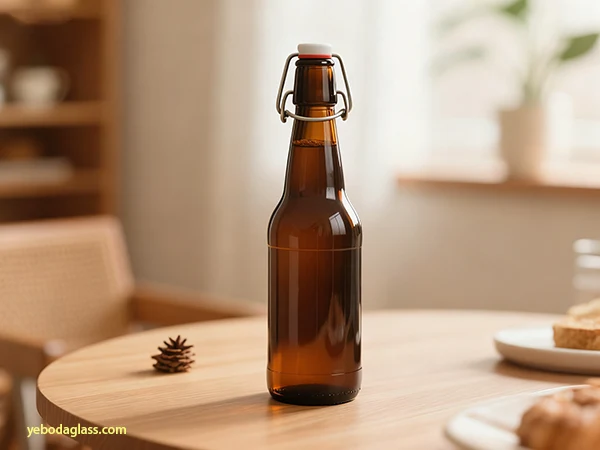
Географический поиск поставщиков и оптимизация логистики
Местоположение поставщиков влияет на их стоимость, сроки поставки и риски, которые можно минимизировать.
Локальные против расширенных цепочек поставок
Преимущества местных поставщиков
- Сокращение сроков поставки и снижение транспортных расходов.
- Более высокая маневренность и более быстрое пополнение запасов.
- Упрощенный контроль и коммуникация.
- Снижение выбросов углекислого газа и поддержка местной экономики
Недостатки местных поставщиков
- Увеличение трудовых и операционных затрат
- Ограниченная база поставщиков или производственные мощности
Преимущества расширенной цепочки поставок
- Конкурентоспособные цены от мировых поставщиков бутылок с откидной крышкой.
- Более широкий выбор материалов и вариантов дизайна.
- Повышенная масштабируемость для крупномасштабного производства.
- Доступ к передовым технологиям поставщиков бутылок с откидной крышкой
Недостатки расширенной цепочки поставок
- Увеличение времени транзита и таможенного оформления.
- Потенциальный риск торговых операций
- Увеличение углеродного следа
Стратегии оптимизации логистики
- Консолидация: Объединяйте поставки для снижения себестоимости единицы продукции.
- Оптимизация маршрута: Внедрите системы планирования логистики на основе искусственного интеллекта для повышения эффективности маршрутов.
- Анализ видов транспорта: Дополняйте друг друга воздушный, морской и железнодорожный виды транспорта.
- Складирование: Региональные центры, занимающие стратегически выгодное положение.
- Интеграция 3PL: Передайте управление вашей логистикой на аутсорсинг, воспользовавшись услугами самых опытных поставщиков в этой области.
Снижение рисков при географических закупках
Кроме того, следует закупать продукцию в различных регионах и поддерживать определенный буферный запас на складах. Системы отслеживания цепочки поставок обеспечат прозрачность процесса поставок. В частности, можно разработать планы действий в чрезвычайных ситуациях для перенаправления поставок. Используя сбалансированные стратегии закупок, компании не только экономят деньги, но и повышают надежность при работе с глобальными или местными поставщиками бутылок с откидной крышкой.
Методологии идентификации поставщиков и первичной проверки
Методы поиска поставщиков
- Онлайн-торговые площадки: Платформы для поиска поставщиков бутылок с откидными крышками, такие как Alibaba, Made-in-China и Thomasnet, основанные на данных о регионе и сертификации, позволяют находить поставщиков таких бутылок по регионам и наличию у них соответствующей сертификации.
- Отраслевые ассоциации: Такие организации, как PAC и IoPP, ведут списки проверенных поставщиков в виде каталогов.
- Торговые выставки: Такие мероприятия с личным присутствием, как Interpack и Pack Expo, — отличный способ проверить поставщиков при личном общении.
- Рекомендации и налаживание связей: Рекомендации от коллег, уже прошедших надежную проверку, — это самый верный способ снизить риски.
- Поиск непосредственно у производителя: Например, поисковые запросы типа «поставщик стеклянных бутылок с откидной крышкой из Европы» или «поставщик бутылок с откидной крышкой из США» приведут к производителям, специализирующимся на такой продукции.
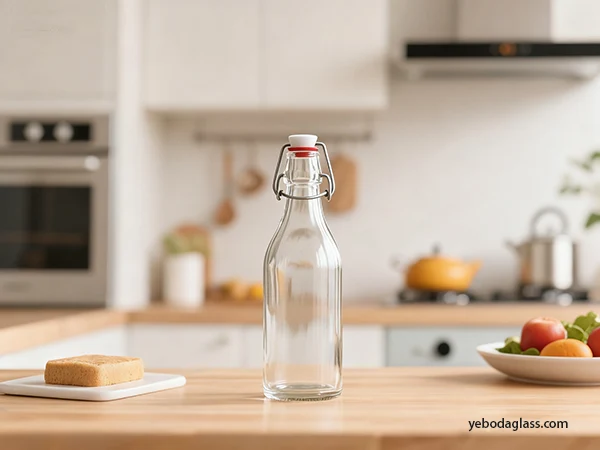
Критерии первичного отбора
Проверка потенциальных поставщиков включает в себя следующие этапы:
- Соответствие продукта применению
- Возможность достижения минимального объема заказа
- Географическая практичность
- Срок действия сертификата
- Оперативность и репутация
- Предварительная финансовая стабильность
Эффективный отбор позволяет сузить круг потенциальных партнеров для детальной оценки.
Усовершенствованная система оценки и отбора поставщиков
Контроль и обеспечение качества
Исследовать:
- Сертификаты (ISO 9001, GMP, BRCGS)
- Процедуры контроля качества и протоколы инспекции
- История уровня дефектов и процессы их устранения
- Примеры испытаний: физические, химические и функциональные характеристики.
Модели ценообразования и структура затрат
Оценивать:
- себестоимость единицы продукции и оснастки
- Условия оплаты и минимального объема заказа
- Правила грузоперевозок и скрытые платежи
- Долгосрочная стабильность цен
Сроки выполнения заказа и производственные мощности
- Проверьте общее время выполнения заказа (производство + транспортировка).
- Проверьте возможность адаптации и расширения при изменении заказа.
- Оцените показатели своевременной доставки.
Сертификация и соответствие нормативным требованиям
- Экологическая сертификация (ISO 14001).
- Аудит на соответствие социальным стандартам (Sedex, SMETA).
Практики устойчивого развития и инновации
- Строительство с использованием ПЦР-полимеров и материалов, пригодных для вторичной переработки.
- Инициативы по сокращению отходов и переходу к циклической экономике.
- Меры по экономии энергии и воды.
Финансовая стабильность и репутация
- Один из способов проверить финансовое положение компании — провести кредитную проверку и оценить ситуацию с точки зрения ее рекомендателей.
- Используя подтвержденные отзывы клиентов, теперь можно внедрить процесс оценки рыночной репутации.
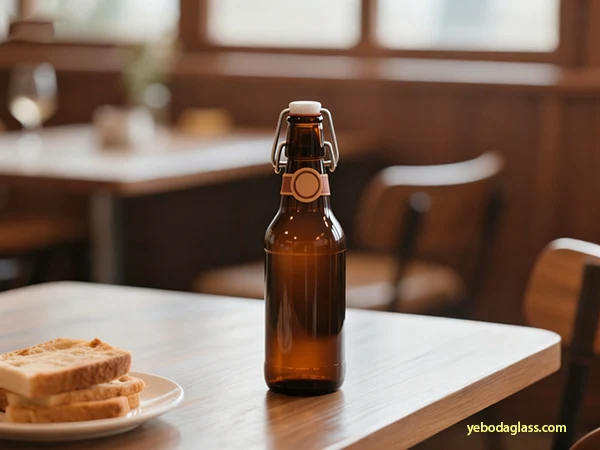
Стратегические соображения и обеспечение устойчивости в будущем
Устойчивость цепочки поставок
- Необходимо диверсифицировать не только поставщиков, но и регионы, откуда поступают сырьевые товары.
- Разработайте страховой запас и планы действий на случай непредвиденных обстоятельств.
- Используйте IoT-отслеживание для обеспечения прозрачности.
Тенденции в области инноваций в материалах
- Биопластики (PLA, PHA)
- Химическая переработка, позволяющая создавать новые материалы, практически идентичные первичным.
- Легкие изделия, выделяющие меньше CO2
Интеграция устойчивого развития
- Использование чистой энергии
- Управление водными ресурсами и отходами
- Системы, которые не производят отходов, и системы, использующие сокращение выбросов углерода.
Технологические достижения
- Автоматизация и контроль качества на основе искусственного интеллекта
- 3D-печать для изготовления первой модели
- «Умная» упаковка с технологией QR-кода или NFC.
Потенциал долгосрочного партнерства
- Дух совместных инноваций и устойчивого развития, который мы разделяем.
- Помощь в виде индивидуального обслуживания и непрерывный прогресс.
- Процесс совместной разработки новых технологий производства бутылок.
Заключение
Инвестиции в репутацию бренда, качество и операционную стабильность осуществляются путем выбора правильного поставщика бутылок с откидной крышкой – будь то местный производитель или международная компания. Для обеспечения долгосрочного роста предприятиям необходимо тщательно оценивать потенциальных партнеров по критериям качества, стоимости, инноваций и устойчивого развития. Устойчивая цепочка поставок, способная справиться с будущими вызовами, гарантируется комплексным поэтапным планом – диверсификация поставщиков, устойчивое снабжение и интеграция технологий являются краеугольными камнями этого плана. Следуя этой структуре, компании не только находят наименее проблемного поставщика бутылок с откидной крышкой, но и создают отношения, которые способствуют развитию инноваций и устойчивого развития, а также поддерживают лидерство на рынке.

